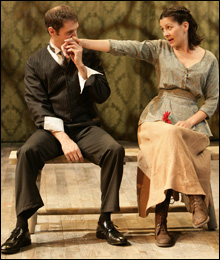The Cherry Orchard , The Women , Summer and Smoke
By CAROLYN CLAY | September 27, 2006

THE CHERRY ORCHARD: A sharp, colloquial, very American translation buoyed by accomplished actors. |
Chekhov insisted that his final masterpiece, The Cherry Orchard, was a comedy and fumed at Stanislavsky’s having his characters suffer through their fraying existences at the pace of a Robert Wilson opus. So you might expect the playwright to present a trophy as big as a samovar to Curt Columbus, whose fleet staging of his own translation of The Cherry Orchard (at Trinity Repertory Company through October 22) is as laden with farce as pathos — though low on cherries in Eugene Lee’s stripped-down set, an assemblage of windowed door frames, dappled drapes, and children’s furniture. And even that is whisked away at the end, as the gentry and their hangers-on mill at the brink of oblivion and the sound of the ax signals pillage and progress amid the beloved trees. Not that all is Keystone Kops as strapped landowner “Lovey” Ranevskaya, her brother Gaev, and their dependents philosophize and make merry while their world slips away. Columbus, who majored in Russian at Yale, has penned a sharp, colloquial, very American translation in which the freed serfs are called what they are: former slaves, at least one of whom, mumbling of the 1861 liberation as “the disaster,” is a no-nonsense old Aunt Tom (the magisterial Barbara Meek as ancient retainer Firs). And Lopakin, the child of slaves who badgers the gentry to save themselves by turning the cherry orchard into cottage plots for “summer people” and in the end does so himself, is played by African-American actor Joe Wilson Jr., whose burst of incredulous triumph as Lopakin realizes that he has bought the big house to which his father and grandfather were not admitted “even through the kitchen” is but the production’s boldest bold move. This splendid actor moves from dazed half-sympathy for the vanquished to irrepressible bounces, then little jumps, falsetto yelps, and near-hysterical command.
Early in the play, Gaev delivers an absurd encomium to a 100-year-old bookcase. Chekhov’s play too has passed the centenary mark and is far worthier of praise than old furniture. Still, Columbus’s broad, sometimes frenetic approach might fail had he less accomplished actors than the vigorous Trinity lot who, like Chekhov, render their characters comical and humane. Phyllis Kay is perhaps too red-blooded for lovelorn blueblood Lovey. But she seems to the manor — and her rich, vivid costumes — born. And she and Brian McEleney, as the garrulous Gaev, nail the Peter Pan in the backward-looking pair. There are good turns, too, by Anne Scurria as German governess Charlotta, whose party tricks mask a need for identity; Fred Sullivan Jr. as neighbor Pishchik, who puts a hand under every turnip he meets, hoping for blood; Stephen Thorne as the obligatory Chekhovian intellectual, dreaming of a finer future; and Emily Young and Crystal Finn as Lovey’s daughters, idealistic and pinched.
 Related
Related:
Best on the boards, Best on the boards, Elemental journeys, More 
- Best on the boards
Huntington Theatre Company artistic director Nicholas Martin recently announced that he would leave his post in 2008.
- Best on the boards
Huntington Theatre Company artistic director Nicholas Martin recently announced that he would leave his post in 2008.
- Elemental journeys
Exploration is the fodder of Five by Tenn and Tom Crean — Antarctic Explorer .
- Perfect Tenn
When Tennessee Williams summered in Provincetown in the early 1940s, Eugene O’Neill was the playwright most associated with the tip of the Cape.
- Doodle bugs
Every teen mag worth its weight in heartthrobs can tell you what your notebook doodlings reveal about your personality.
- Play by play: September 18, 2009
Boston's weekly theater schedule
- Eternal questions
Bard or beard — that is the question.
- Broken Glass
“The scene is memory,” Tennessee Williams writes in his opening notes to The Glass Menagerie, and then: “Memory takes a lot of poetic licence.”
- Sleeping with the enemy
Who knew the azure waters off the Amalfi Coast flowed into the River Styx?
- Fall on the boards
There are tours to the former Czechoslovakia, Romania, Italy, Iraq, the Aran Islands, and even the Underworld on area stages this fall.
- A brutal world
Orpheus Descending is such an urgent work that you can see how Tennessee Williams allowed an earlier version of it to pop squalling into the world before it was fully gestated.
- Less

 Topics
Topics:
Theater
, Celebrity News, Entertainment, Joan Crawford, More  , Celebrity News, Entertainment, Joan Crawford, Cole Porter, Nancy Carroll, Brian McEleney, Phyllis Kay, Maureen Keiller, Tennessee Williams, Michael Wilson, Less
, Celebrity News, Entertainment, Joan Crawford, Cole Porter, Nancy Carroll, Brian McEleney, Phyllis Kay, Maureen Keiller, Tennessee Williams, Michael Wilson, Less 